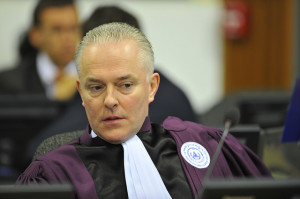
Credit: ECCC/Mark Peters
Andrew Cayley, the UN-appointed co-prosecutor for the Extraordinary Chambers in the Courts of Cambodia (ECCC), will resign from his position after four years of service, citing personal reasons. “I wish the court well, and I certainly hope that some of the immediate financial issues the court faces can be resolved to allow the caseload to be completed in an orderly and timely fashion,” he said in a prepared statement. His resignation will be effective on September 16. [Washington Post] Nicholas Koumjian, who has previously worked at the Special Court for Sierra Leone and the International Criminal Tribunal for the former Yugoslavia, will arrive in October as his replacement. [Voice of America]
Cayley’s resignation comes after more than 100 Cambodian national staff members of the tribunal began striking due to the Cambodian government’s failure to pay them for their work since June of this year. [UN News Centre] Under the rules created by both the UN and the Cambodian government when establishing the ECCC , the UN funds the court’s UN-appointed international staff, while the Cambodian government funds the government-appointed national staff. [Human Rights Watch] The Cambodian government currently lacks $3 million to support the tribunal’s local operation costs, which include staff wages. [Al-Jazeera]
In an earlier ceremony marking the centennial of the Peace Palace at The Hague, UN Secretary General Ban Ki-Moon expressed concern over the tribunal’s financial condition, stating that “[f]inancial failure would be a tragedy for the people of Cambodia, who have waited so long for justice.” He also urged the international community to make further donations in order “to see all the cases through to their conclusion.” [UN]
The ECCC, more commonly known as the Khmer Rouge tribunal, is a special hybrid court formed after the Cambodian government requested assistance from the UN to help prosecute the senior leaders of the Khmer Rouge regime alleged to be responsible for an estimated 1.7 million individuals’ deaths from starvation, torture, forced labor, and execution between April 17, 1975 and January 7, 1979. The tribunal operates within the Cambodian judicial system while receiving international support from the United Nations Assistance to the Khmer Rouge Trials.
The court is entering the final stages of the Case 002/01 trial. Although four of Khmer Rouge’s senior leaders were originally indicted, the proceedings against former Deputy Prime Minister for Foreign Affairs Ieng Sary were terminated upon his death, while the prosecution of his wife and former Social Affairs Minister Ieng Therith ended when she was found unfit to stand trial due to mental incompetence. [ECCC] She has subsequently been released from provisional detention and is now under judicial supervision. [ECCC] Former head of state Khieu Samphan and party leader Nuon Chea still stand trial, charged with grave breaches of the Geneva Conventions of 1949, genocide, and crimes against humanity. For more information, see IJRC’s previous news post on Case 002. Closing statements are set for the end of October.
